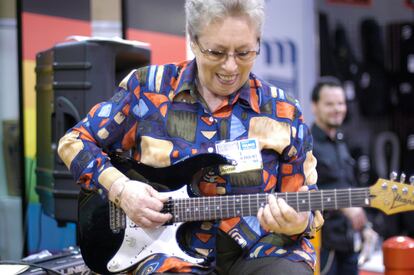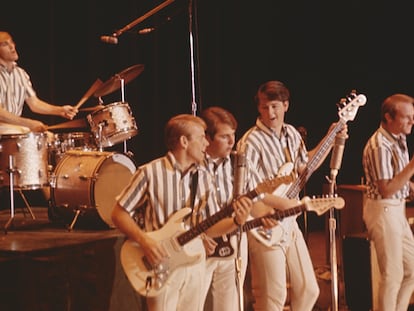Carol Kaye, she doesn't want honors

Strictly opinion pieces that reflect the author's own style. These opinion pieces must be based on verified data and be respectful of individuals, even if their actions are criticized. All opinion columns by individuals outside the EL PAÍS editorial team will include, after the last line, a byline—no matter how well-known—indicating the author's position, title, political affiliation (if applicable), or main occupation, or any that is or was related to the topic addressed.

“A tempest in a teacup,” the English would say, a trifle, an anomaly. I assume you're familiar with the concept of the Hall of Fame, institutions that recognize merit beyond sales figures or similar metrics, generally as a result of voting among people dedicated to a certain activity. The Rock and Roll Hall of Fame is relatively new, created in the boom times, back in the 1980s. An idea initially developed with somewhat frivolous procedures (and I speak from experience: courtesy of Ahmet Ertegun, its main inspiration, I participated in the voting in its early years).
Although many criticize its opacity, this Hall of Fame serves as a powerful promotional lever. Artists are desperate to get in, whether out of ego or to add a few very useful stripes to their cachet. Few have turned down this honor. The Sex Pistols did , of course, and a country legend like Dolly Parton wanted to withdraw her candidacy, claiming she wasn't a rock star in any sense (even though she was elected and—professional above all—appeared dressed in latex and proclaiming herself a rock star at heart).
The repudiation we're dealing with today has as its protagonist Carol Kaye, a bassist everyone has heard of, even if few recognize her name. Raised in a dysfunctional family, she was precocious: at 15, she became pregnant and had to become a professional jazz guitarist in bands of various persuasions. Her flexibility opened the doors to recording studios. She played on hits by Ritchie Valens ( La Bamba ) and producer Phil Spector and his epigone Sonny Bono ( Sonny & Cher ). She thus gained a reputation as an imaginative bassist, capable of cementing a song as suggestive as Nancy Sinatra's " These Boots Are Made for Walkin' ."
Carol's contributions to Los Angeles pop are literally incalculable. During the 1960s, she would often do three sessions a day, producing at least three songs by various artists. She was a favorite of Brian Wilson's for The Beach Boys recordings. With Ray Charles, she experimented, playing her instrument with the fuzz pedal. Her bass could be the lead instrument on recordings by Glenn Campbell ( Wichita Lineman ) or Mel Tormé.
Her ease and inventiveness were appreciated by soundtrack composers from Lalo Schifrin to Quincy Jones, and by daring jazzmen like Cannonball Adderley and Gábor Szabó. The problem: her contributions ended up subsumed within the legend of the Wrecking Crew , that protean collective that dominated Californian pop. It should be noted that she herself accepted this identification when participating in the famous 2008 documentary of the same name.
But, at 90, Carol hates the name ("The Wrecking Crew") and advocates for the simple classification of studio musicians. So she refuses to participate in the Rock and Roll Hall of Fame ceremony. Two explanations: her dislike of drummer Hal Blaine, who popularized the name. And her resentment of the conditions of that particular Hall of Fame, which doesn't pay for travel and requires the honoree to purchase (expensive) tickets for their guests. Didn't we mention this? Almost all Halls of Fame are for-profit entities: it's the American way . they add.
Do you want to add another user to your subscription?
If you continue reading on this device, it will not be possible to read it on the other device.
ArrowIf you want to share your account, upgrade to Premium, so you can add another user. Each user will log in with their own email address, allowing you to personalize your experience with EL PAÍS.
Do you have a business subscription? Click here to purchase more accounts.
If you don't know who's using your account, we recommend changing your password here.
If you decide to continue sharing your account, this message will be displayed indefinitely on your device and the device of the other person using your account, affecting your reading experience. You can view the terms and conditions of the digital subscription here.

Music journalist for radio, television, and print media, occupations discussed in the book "The Best Job in the World." This doesn't prevent him from occasionally dedicating himself to crime novels, film, comics, TV series, and history.
EL PAÍS






